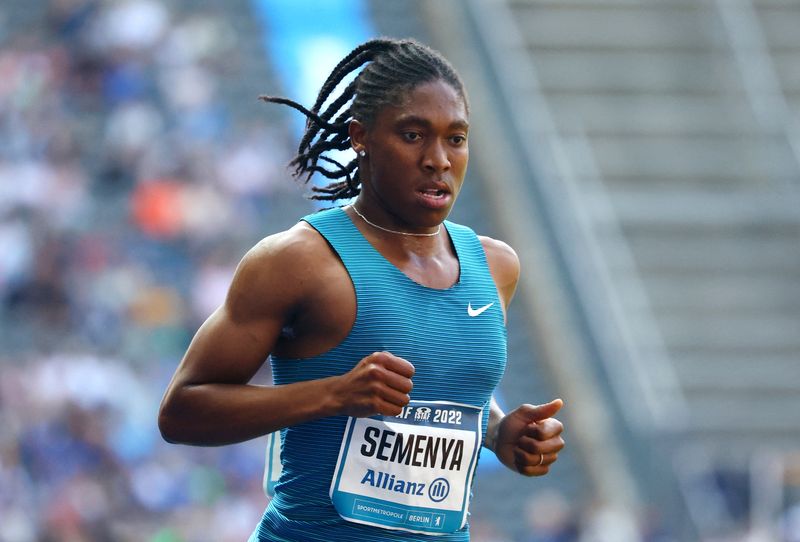Athletics-Olympics no longer Semenya’s major goal amid court fight
2023.10.30 06:59

© Reuters. File photo: Athletics – Golden League Track and Field ISTAF – The Olympic Stadium, Berlin, Germany – September 4, 2022 South Africa’s Caster Semenya in action during the women’s 5000m REUTERS/Fabrizio Bensch/File photo
By Hugo Boogaerdt
PRETORIA (Reuters) – Double Olympic 800m champion Caster Semenya’s major aim is no longer to win medals but to continue her legal battle against World Athletics to overturn requirements that female athletes with differences in sexual development (DSDs) medically reduce their testosterone levels.
Semenya, 32, wants to hold World Athletics to account for what she terms discrimination against athletes with hyperandrogenism, a condition characterised by higher than usual levels of testosterone, a hormone that increases muscle mass and strength.
Although still training, Semenya appears to have given up on her career on the track as she turns to coaching and maintaining her legal battle to have the regulations abolished.
“My last chance to win at the Olympics was in 2016 – Paris is not my goal,” Semenya told Reuters. “It is more about winning my battles against the authorities and me fighting for what is right.
“In running I have achieved everything I ever wanted. They have never stopped me from being the great athlete I am. I went four years unbeaten; I’ve done my part.
“It is no longer about me fighting to compete, it is about fighting for what is right. Fighting for the upcoming generation, because there are a lot of kids that are affected by the same ruling. This battle will not finish now. We will fight until the end.”
Europe’s top human rights court ruled in favour of Semenya in July by a majority of four to three, saying her appeal to a Swiss Federal Tribunal following the dismissal of her case by the Court of Arbitration for Sport had not been properly heard.
That decision could yet be appealed and is not a judgement against the World Athletics regulations.
“I fight for what is right, for humanity and for inclusivity. And I fight for all women in the world. This young, upcoming generation cannot face the same scrutiny, the same judgement. They must be treated right.”
Semenya believes World Athletics’ regulations are a “racial issue”. “There is no pink skin person who is affected by it (the regulations). It is only brown-skinned females. That is the simple truth,” she said.
“It targets only Africans and Asians. So, you have to say, is this in the best interests of women’s sport, or in the best interests of certain women?”
World Athletics has denied this is the case.
“World Athletics has only ever been interested in protecting the female category. If we don’t, then women and young girls will not choose sport. That is, and has always been, the Federation’s sole motivation,” a spokesperson for the sports body said.
“DSD conditions occur all around the world and are usually diagnosed at birth. In Africa, like in other developing areas or countries, the diagnosis often comes later because there is a lack of post-natal monitoring and checks,” the spokesperson said.
“This occurs for many reasons, and much is being done in some countries to address this.”








